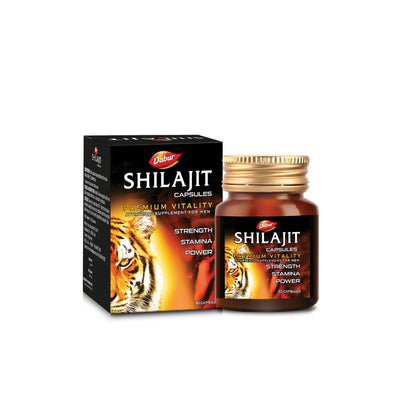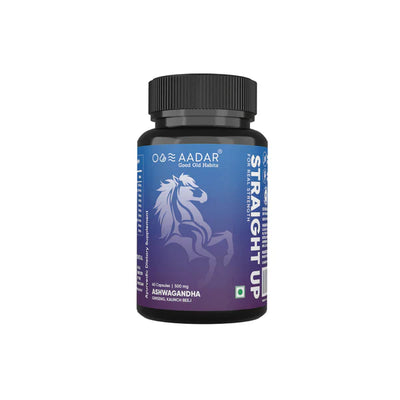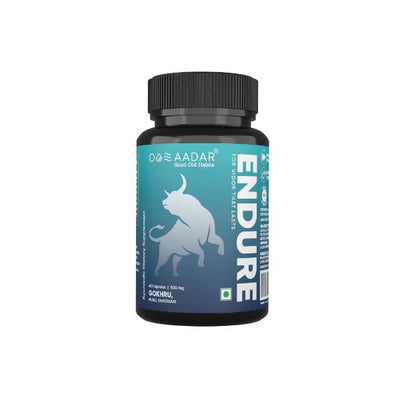الآثار الجانبية للأشواغاندا ومن يجب عليه تجنبها؟
عادةً ما تكون الآثار الجانبية للأشواغاندا في الإمارات العربية المتحدة خفيفة، ولكن كما هو الحال مع أي مكمل غذائي، من المهم فهم كيفية تفاعله مع الجسم. على الرغم من أن الأشواغاندا (ويثانيا سومنيفيرا) معروفة بفوائدها الطبيعية في تخفيف التوتر وتعزيز الطاقة، إلا أن بعض المستخدمين قد يعانون من انزعاج أو آثار جانبية طفيفة، وذلك حسب الجرعة والحالة الصحية وجودة المنتج.
إذا كنت تفكر في إضافة أشواغاندا إلى روتينك اليومي، فإن هذا الدليل يشرح آثارها الجانبية المحتملة، والاحتياطات، ومن يجب عليه تجنبها لضمان الاستخدام الآمن والفعال.
فهم طبيعة الأشواغاندا
الأشواغاندا عشبة مُكيِّفة، أي أنها تُساعد الجسم على إدارة التوتر واستعادة التوازن. تُنظِّم الكورتيزول، وتدعم صحة الهرمونات، وتُعزِّز الطاقة بشكل طبيعي.
ومع ذلك، نظرًا لأنه يؤثر على الأنظمة الهرمونية والعصبية، فإنه يمكن أن يسبب آثارًا جانبية خفيفة لدى بعض الأفراد - وخاصةً إذا تم تناوله بكميات زائدة أو مع أدوية غير متوافقة.
الآثار الجانبية الشائعة للأشواغاندا
يُعتبر الأشواغاندا آمنًا لمعظم البالغين عند استخدامه بالجرعات الموصى بها (300-600 ملغ يوميًا). ومع ذلك، قد يعاني بعض المستخدمين من آثار جانبية خفيفة ومؤقتة مع تكيف الجسم.
1. اضطراب الجهاز الهضمي
يعاني بعض الأشخاص من انتفاخ خفيف، أو تقلصات في المعدة، أو غثيان عند تناول أشواغاندا على معدة فارغة.
نصيحة: تناول دائمًا أشواغاندا بعد الوجبات مع الماء أو الحليب لتحسين الهضم.
2. النعاس أو التعب
يمكن أن يسبب أشواغاندا الاسترخاء والهدوء، مما قد يؤدي إلى النعاس الخفيف لدى المستخدمين الحساسين، وخاصة عند تناوله بجرعات عالية أو قبل النوم.
إذا كنت تعاني من التعب أثناء النهار، حاول تقليل الجرعة أو تناولها في المساء بدلاً من ذلك.
3. انخفاض ضغط الدم
يمكن للأشواغاندا أن تخفض ضغط الدم بشكل طبيعي بسبب تأثيراتها المهدئة والموسعة للأوعية الدموية.
يجب على الأشخاص الذين يعانون من انخفاض ضغط الدم أو يتناولون أدوية خافضة للضغط استشارة أخصائي الرعاية الصحية قبل الاستخدام.
4. تحفيز الغدة الدرقية
قد يؤدي تناول أشواغاندا إلى زيادة مستويات هرمون الغدة الدرقية (T3 وT4)، وهو أمر قد يكون مفيدًا لأولئك الذين يعانون من قصور الغدة الدرقية ولكنه محفوف بالمخاطر لأولئك الذين يعانون من فرط نشاط الغدة الدرقية.
إذا كنت تعاني من مشكلة في الغدة الدرقية أو تتناول أدوية الغدة الدرقية، فمن المهم مراقبة مستويات الهرمون بانتظام.
5. التأثيرات الهرمونية
يؤثر أشواغاندا على مستويات الكورتيزول والتستوستيرون، والتي يمكن أن تكون مفيدة للتوازن الهرموني ولكنها قد تتداخل مع بعض الحالات أو الأدوية الغدد الصماء.
يجب على النساء اللاتي يعانين من اختلال التوازن الهرموني أو يتناولن العلاج الهرموني استشارة طبيب أمراض النساء قبل الاستخدام.
(انظر أيضًا: أشواغاندا للنساء في الإمارات العربية المتحدة )
6. ردود الفعل التحسسية الخفيفة
على الرغم من ندرتها، قد يعاني بعض المستخدمين من ردود فعل تحسسية مثل الطفح الجلدي أو الحكة، وخاصة مع التركيبات منخفضة الجودة أو غير النقية.
الحل: اختر دائمًا مكملات أشواغاندا النقية والمختبرة في المختبر من البائعين الموثوق بهم في الإمارات العربية المتحدة.
(استكشف: شراء أشواغاندا أصلية في الإمارات العربية المتحدة )
آثار جانبية خطيرة ولكنها نادرة
الآثار الجانبية الخطيرة نادرة ولكنها قد تحدث في حالات محددة، وخاصة عندما يتم تناول أشواغاندا بجرعات عالية جدًا (أكثر من 1000 ملغ / يوم) أو مع أدوية معينة.
تشمل المخاطر المحتملة ما يلي:
-
اضطرابات معوية شديدة
-
تعب أو دوار غير عادي
-
التقلبات الهرمونية لدى الأفراد الحساسين
-
تورم تحسسي (نادر للغاية)
في حالة حدوث أي من هذه الأعراض، يجب التوقف عن الاستخدام فورًا واستشارة مقدم الرعاية الصحية.
من يجب عليه تجنب الأشواغاندا؟
على الرغم من أن أشواغاندا طبيعية ويتحملها معظم الناس بشكل جيد، إلا أنه يجب على بعض الأفراد تجنبها أو استخدامها فقط تحت إشراف طبي.
1. النساء الحوامل والمرضعات
قد يعمل الأشواغاندا على تحفيز انقباضات الرحم، مما قد يزيد من خطر حدوث المضاعفات أثناء الحمل.
كما لا ينصح به أثناء الرضاعة الطبيعية بسبب عدم وجود أبحاث كافية حول السلامة.
2. الأشخاص الذين يعانون من فرط نشاط الغدة الدرقية
كما ذُكر سابقًا، يُمكن للأشواغاندا تحفيز نشاط هرمون الغدة الدرقية. يُنصح الأشخاص الذين يعانون من فرط نشاط الغدة الدرقية بتجنبها أو استخدامها تحت إشراف طبي صارم.
3. الأفراد المصابون بأمراض المناعة الذاتية
نظرًا لأن أشواغاندا يمكن أن تنشط الجهاز المناعي، فيجب على الأشخاص الذين يعانون من اضطرابات المناعة الذاتية مثل الذئبة، أو التهاب المفاصل الروماتويدي، أو التصلب المتعدد تجنبها، لأنها قد تؤدي إلى تفاقم النشاط المناعي.
4. الأشخاص الذين يتناولون المهدئات أو أدوية القلق
يعمل الأشواغاندا على تعزيز الاسترخاء ويمكن أن يزيد من تأثير المهدئات أو الأدوية المضادة للقلق أو أدوية النوم.
قد يؤدي الجمع بين الأمرين إلى النعاس المفرط أو انخفاض اليقظة.
5. الأفراد الذين يعانون من انخفاض ضغط الدم
نظرًا لأن أشواغاندا يمكن أن تخفض ضغط الدم، فيجب على الأشخاص الذين يعانون بالفعل من انخفاض ضغط الدم أو يتناولون أدوية ضغط الدم استخدامها بحذر.
6. الأشخاص الذين يستعدون للجراحة
قد يؤثر الأشواغاندا على التخدير ويُبطئ الجهاز العصبي المركزي. يُنصح بالتوقف عن تناوله قبل أسبوعين على الأقل من أي عملية جراحية مُقررة.
إرشادات الاستخدام الآمن
للتقليل من الآثار الجانبية وضمان الاستخدام الآمن لأشواغاندا:
-
الالتزام بالجرعة الموصى بها (300-600 ملغ يوميا).
-
تناوله بعد الأكل وليس على معدة فارغة.
-
تجنب تناوله مع الكحول أو المهدئات القوية.
-
اشتري فقط منتجات أشواغاندا المعتمدة وعالية الجودة.
الاستمرارية مهمة - الإفراط في تناولها أو عدم انتظامها يمكن أن يقلل من فعاليتها ويزيد من الآثار الجانبية.
(تعرف على المزيد: كيفية تناول أشواغاندا – الجرعة والنصائح )
كيفية تحديد أشواغاندا آمنة وعالية الجودة
عند شراء الأشواغاندا في الإمارات العربية المتحدة، تختلف جودتها باختلاف العلامة التجارية. لتجنب الآثار الجانبية الناتجة عن الشوائب أو الإضافات:
-
اختر المكملات الغذائية التي تحتوي على نسبة موحدة من ≥5% من الويتانوليدات.
-
ابحث عن المنتجات المعتمدة من GMP والمختبرة في المختبر.
-
التحقق من المكونات - يجب أن تحتوي على مستخلص الجذر فقط، وليس مسحوق الأوراق.
-
تأكد من بيانات اعتماد البائع الأصلية والملصقات الشفافة.
للحصول على خيارات آمنة وموثوقة، تسوق من GetKuwa - منصة صحية موثوقة تقدم أشواغاندا أصلية في الإمارات العربية المتحدة، تم الحصول عليها بعناية واختبارها للتأكد من نقائها وفعاليتها.
كيفية إدارة الآثار الجانبية
إذا كنت تعاني من انزعاج خفيف بعد تناول أشواغاندا:
-
تقليل الجرعة
-
التبديل إلى شكل كبسولة (أسهل للهضم).
-
تناوله مع الطعام أو الحليب الدافئ.
-
حافظ على رطوبة جسمك طوال اليوم.
إذا استمرت الأعراض، توقف عن الاستخدام واستشر مقدم الرعاية الصحية الخاص بك.
خاتمة
لا تزال الأشواغاندا من أكثر أعشاب الأيورفيدا أمانًا وفائدةً المتاحة اليوم، ولكن كجميع العلاجات الطبيعية الفعّالة، يجب استخدامها بمسؤولية. فهم آثارها الجانبية ومعرفة من يجب عليه تجنبها يضمن استخدامها بأمان وفعالية.
بالنسبة لمستخدمي دولة الإمارات العربية المتحدة الذين يسعون إلى تخفيف التوتر والطاقة والتوازن الهرموني، يمكن أن تقدم أشواغاندا فوائد كبيرة عند الحصول عليها واستخدامها بشكل صحيح.
لضمان السلامة والجودة، قم بشراء أشواغاندا الأصلية في الإمارات العربية المتحدة من GetKuwa - حيث يتم اختبار جميع المكملات الغذائية في المختبر والحصول على شهادة نقاء.













